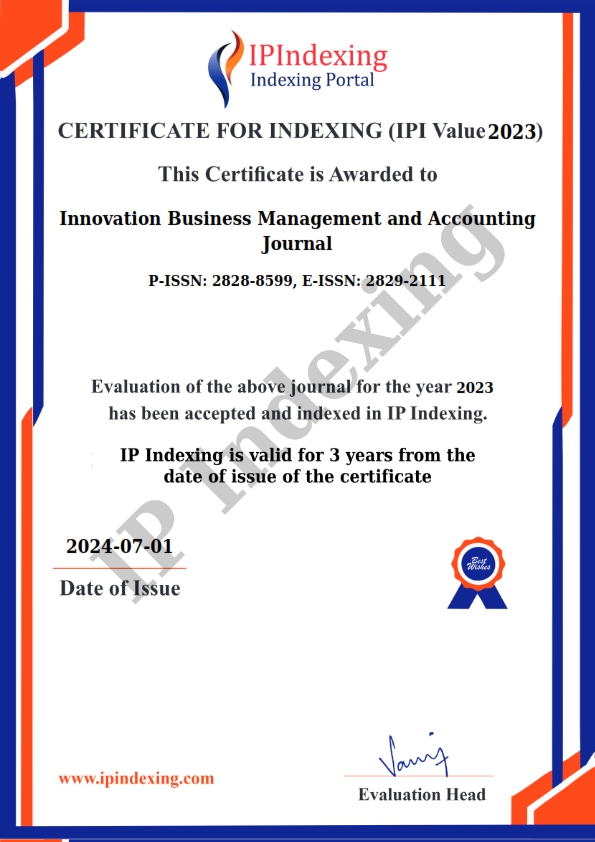The Influence of Competence, Training, and Career Development on the Performance Members of Hanudnas Pusdiklat Surabaya
DOI:
https://doi.org/10.56070/ibmaj.2024.016Keywords:
Career Development, Competence, Member Performance, TrainingAbstract
This research aims to analyze the influence of Competency, training, and career development on the performance of the Surabaya Hanudnas Education and Training Center members simultaneously, partially, or dominantly. Location: This research was conducted at the Hanudnas Surabaya Education and Training Center, Jl. Wiratno, Comp. Kenjeran, District. Bulak, Surabaya, East Java 60121. The type of research used is explanatory research. The population in this study were all students of the Surabaya Hanudnas Education and Training Center, totaling 200 students with a total sample of 135. Data analysis used descriptive analysis techniques and multiple regression analysis to determine the influence of the variables competency, training, and career development on member performance, which will then be continued with hypothesis testing. The research results show that Competency, training, and career development affect the performance of the Surabaya Hanudnas Education and Training Center members, both simultaneously and partially. Furthermore, this research identified that career development has a dominant influence on the performance of the Surabaya Hanudnas Education and Training Center members. The expected contribution from the results of this research can be used as input for practitioners and the Surabaya Hanudnas Education and Training Center so that members' performance will increase. For Pusdikhanudnas Surabaya to further improve the performance of its members, this is done by improving the quality of competence members possess.
Downloads
References
Arifin, A. H., Raza, H., Saputra, J., & Puteh, A. (2020). The influence of recruitment and career development towards employee performance: A mediating role of competence. Journal of Talent Development and Excellence, 12(1), 1040-1055.
Chien, G. C., Mao, I., Nergui, E., & Chang, W. (2020). The effect of work motivation on employee performance: Empirical evidence from 4-star hotels in Mongolia. Journal of Human Resources in Hospitality & Tourism, 19(4), 473-495. https://doi.org/10.1080/15332845.2020.1763766
Decius, J., Schaper, N., & Seifert, A. (2021). Work characteristics or workers’ characteristics? An input-process-output perspective on informal workplace learning of blue-collar workers. Vocations and Learning, 14(2), 285-326. https://doi.org/10.1007/s12186-021-09265-5
Hajiali, I., Kessi, A. M. F., Budiandriani, B., Prihatin, E., & Sufri, M. M. (2022). Determination of work motivation, leadership style, employee competence on job satisfaction and employee performance. Golden Ratio of Human Resource Management, 2(1), 57-69. https://doi.org/10.52970/grhrm.v2i1.160
Iis, E. Y., Wahyuddin, W., Thoyib, A., Ilham, R. N., & Sinta, I. (2022). The effect of career development and work environment on employee performance with work motivation as intervening variable at the office of agriculture and livestock in Aceh. International Journal of Economic, Business, Accounting, Agriculture Management and Sharia Administration (IJEBAS), 2(2), 227-236. https://doi.org/10.54443/ijebas.v2i2.191
Kaya, B., & Karatepe, O. M. (2020). Does servant leadership better explain work engagement, career satisfaction and adaptive performance than authentic leadership?. International Journal of Contemporary Hospitality Management, 32(6), 2075-2095. https://doi.org/10.1108/IJCHM-05-2019-0438
Marwansyah. (2016). Human Resource Management. Alfabeta.
Riyanto, S., Endri, E., & Herlisha, N. (2021). Effect of work motivation and job satisfaction on employee performance: Mediating role of employee engagement. Problems and Perspectives in Management, 19(3), 162-174. https://doi.org/10.21511/ppm.19(3).2021.14
Rizki, V. L., & Sulistyan, R. B. (2022). Manajemen Sumber Daya Manusia. Widya Gama Press.
Sugiyono. (2016). Metode Penelitian Kuantitatif, Kualitatif dan R & D. CV. Alfabeta.
Sulistyan, R. B. (2020). Lecturer E-learning Training: The Role of Social Exchange Theory. Empowerment Society, 3(2), 50-56. https://doi.org/10.30741/eps.v3i2.589
Sulistyan, R. B., Paramita, R. W. D., Setyobakti, M. H., Rizal, N., & Lukiana, N. (2020). Perceived Organizational Support on Employee Performance: The Mediating Effect of Job Stress. Proceedings of the 1st International Conference on Social Science, Humanities, Education and Society Development. https://doi.org/10.4108/eai.13-10-2020.2303710
Tavares, M. C., Azevedo, G., & Marques, R. P. (2022). The challenges and opportunities of era 5.0 for a more humanistic and sustainable society—a literature review. Societies, 12(6), 149. https://doi.org/10.3390/soc12060149
Downloads
Published
How to Cite
Issue
Section
License
Copyright (c) 2024 Rizki Anggriawan Saputra, Mohammad Choldum Sina Setyadi, Bambang Supriadi

This work is licensed under a Creative Commons Attribution-ShareAlike 4.0 International License.



